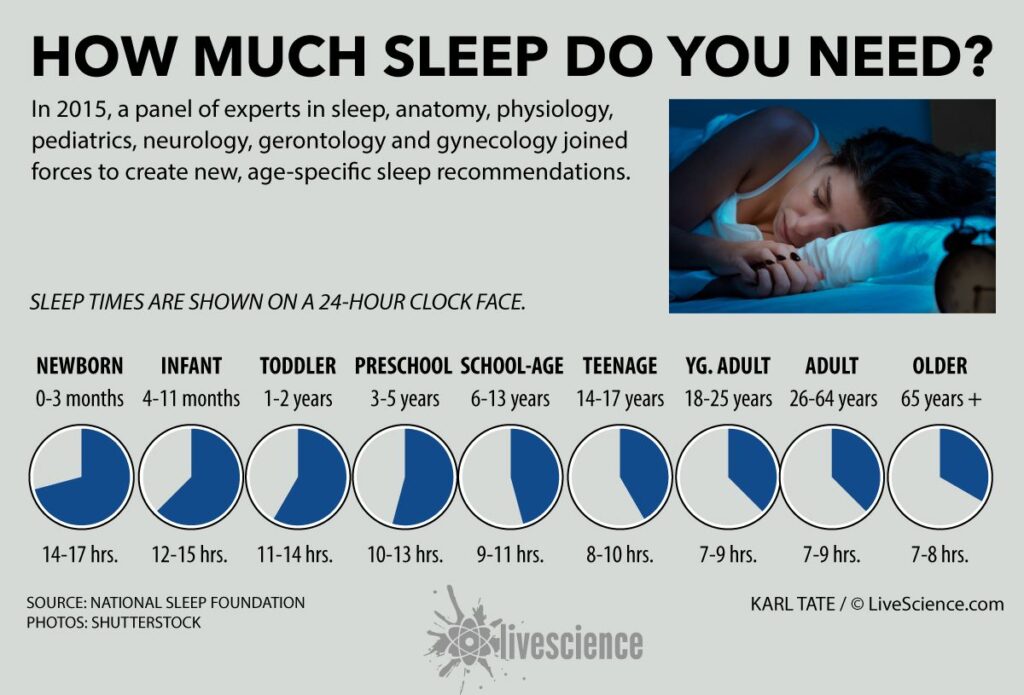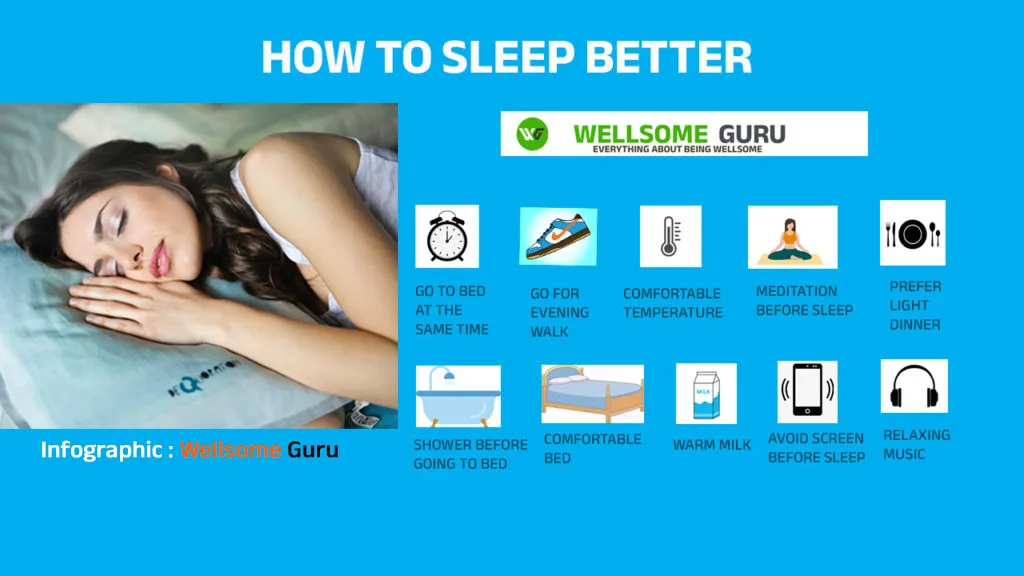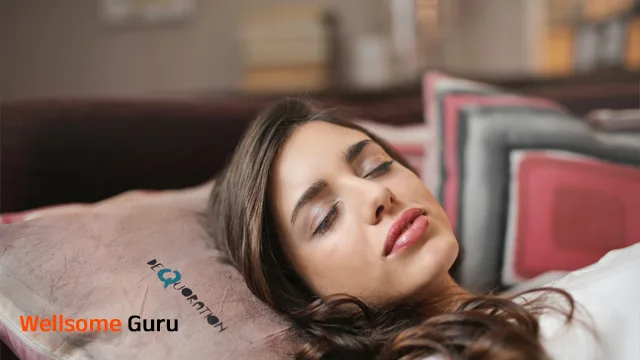
How many hours of sleep do I need?
In this article, we will discuss the science behind quality and quantity of sleep required for a person. At the end of this article, you will be able to find answer to How many hours of sleep do I need?
Sleep is a very important aspect of our life. It is an essential part of overall health and well-being. It’s the point at which our bodies and psyches revive, fix, and merge recollections. Unfortunately, the question of how many hours of sleep do I need , doesn’t have a short and sweet answer. It depends on many factors like, age, type of body, type of work you are doing during day, your health condition etc. Despite the widespread belief that adults require 7-9 hours per night, individual requirements are influenced by a variety of factors.
Understanding the various stages of sleep is essential for comprehending the recommended amount of sleep. Sleeping process comprises of exchanging patterns of Fast Eye Movement (REM) and Non-REM sleeping. Non-REM sleeping incorporates three phases: N1 (light rest), N2 (more profound rest), and N3 (slow-wave rest). REM sleeping is related with clear dreaming and mental reclamation. Yes, we see dreams in this phase.
Sleeping Patterns by Age
Age-specific recommended durations are as follows:
Recommended Hours of Sleep by Age
- Infants (0-3 months): 14-17 hours
- Infants aged 4 to 11 months: 12-15 hours
- Toddlers (ages 1-2): 11-14 hours
- Preschoolers (3-5 years): 10-13 hours
- Young kids (6-13 years): 9-11 hours
- Teens (14-17 years): 8-10 hours
- Youthful grown-ups (18-25 years): 7-9 hours
- Grown-ups (26-64 years): 7-9 hours
- More seasoned grown-ups (65+ years): 7-8 hours

Factors Affecting Sleeping requirements
While these rules present an overall suggestion, individual Sleeping requirements can differ essentially founded on a few variables:
- Genetics: Genetics has a big role to play in deciding if somebody is normally a “short sleeper” or a “long sleeper.”
- Lifestyle: Actual work, feelings of anxiety, and everyday schedules influence how much rest your body requires.
- Ailments: Persistent sicknesses like rest apnea, a sleeping disorder, and gloom can upset Sleeping examples and impact sleep length.
- Age: As you get older, your sleeping habits change, and older people often sleep less and wake up more often, while Infants and young children need more sleep than adults.
- Quality versus Amount of Sleep: The nature of sleep matters as much as the amount. Sleep that is not interrupted is more restorative than sleep that is broken up.
- Sleep Deficit: Getting insufficient sleep leads to sleep deficit, which accumulates and can lead to create problems in cognitive functioning, mood, and overall health.
- Variability by Individual: Similarly as certain individuals are morning birds and others are evening creatures, people have different needs.
- Activity level: People who are more active tend to need more sleep.
- Circadian rhythm: Our body’s natural sleep-wake cycle. Circadian rhythms determines when to go for sleep. These natural processes depends on the light and dark. If detects enough darkness , then it may send signal to go for sleeping. This affects most living things, including animals, plants, and microbes.
- Medications: Some medications can also interfere with sleep.
- Pregnancy: Changes in hormone levels and physical discomfort can result in poor sleep quality.

Quality versus Quantity : Is sleep duration important ?
When we think of quality versus quantity, the quality of sleep is more important. A 6 hours of sleep may bee enough to recharge you for the next morning, while an 8 hour sleep may not be enough , if it was a disrupted sleep. So, in essence, you should focus on getting good quality sleep, you should cultivate good sleeping habits that lead to a very good sleep. If you follow that good sleep habits , then you will not have to worry about How many hours of sleep do I need?
While quantity of sleep can easily be measured in hours, determining sleep quality is somewhat difficult task. But, still we can work our it using some factors like …
- Latency: This factor is a measurement of a person requiring time to fall asleep. Falling asleep as fast as possible is a sign of healthy sleep latency.
- Efficiency: Sleep efficiency refers directly to quality of sleep, how much time in bed was actually spent in deep sleep is called Sleep efficiency. As per experts a healthy standard sleep efficiency should be around 85%.
- Wakeup Time: How often a person wakes up during the night. Too much time spent awake at night is the sign of poor quality sleep.
Paying attention to Your Body
Eventually, the way to deciding your ideal rest duration is paying attention to your body. Focus on how you feel during the day. Do you feel revived and alert, or would you say you are drowsy and exhausted? Keep a rest journal to follow designs and distinguish how much rest that leaves you feeling your best.
Tips for Better Sleep : How to sleep better :
Developing good sleep habits can improve the quality of your sleep:
- Keep a Predictable Timetable: Head to sleep and awaken at similar times everyday, even on ends of the week.
- Create a Relaxing Bedtime Routine: Do something calming before going to bed to tell your body that it’s time to sleep now.
- Establish an Agreeable Sleeping environment: Keep your room dark, calm, and at an agreeable temperature. Proper temperature and proper darkness in your bed room is very important for quality sleep. Because of you are getting quality sleep, you will require less hour to get revitalize in the morning.
- Reduce your screen time: Blue light from screens can obstruct your body’s regular sleep cycle. Stay away from screens an hour prior to sleep time. There are many apps available to monitor your screen time, you can use them.
- Be Aware of Food and Drink: Stay away from weighty dinners, caffeine, and liquor near sleep time.
- Keep gap: keep a gap 0f minimum 2 to 3 hours between you diner and sleep time. Don’t go to bed immediately after dinner. I possible, finish your diner before 8 PM.

Conclusion: Now you have understood that there are a lot of different things that go into determining how much sleep you need. While rules provide an overall system, In general, you should try not to go below 6 hours and not to sleep more than 9 hours. Understanding your body’s prerequisites is up to you and only you can decide the answer to the question “How many hours of sleep do I need?”. By paying attention to your body’s signals and learning healthy sleep habits, you can find your optimal sleep requirement and you will be able to improve your overall well-being.
is 6 hours of sleep enough, how much sleep do you need by age, minimum amount of sleep needed for brain function, how much sleep do i need calculator, is 7 hours of sleep enough, how many hours of sleep do adults need for weight loss, best sleeping hours, sleep, how much sleep do you need,8 hours of sleep, how much sleep do i need, how many hours of sleep do I need, how many hours of sleep do you need, how many hours of sleep do adults need, how many hours of sleep do you need a day, how many hours of sleep do you need a night, how many hours of sleep do you need to grow, how many hours of sleep do you need per night, how many hours of sleep do you need to function.
You may also like : 5 things why you must use Air Fryer in 2023
More : Epworth Sleepiness Scale (ESS); Pittsburgh Sleep Quality Index (PAQI); insufficient sleep syndrome; restfulness; sleep duration; sleepiness.











Comments on “How many hours of sleep do I need?”
Comments are closed.